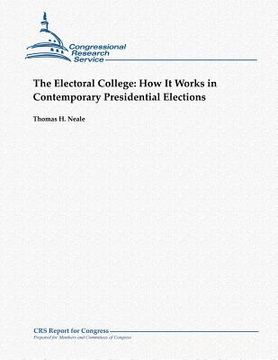The Electoral College: How It Works in Contemporary Presidential Elections (en Inglés)
Reseña del libro "The Electoral College: How It Works in Contemporary Presidential Elections (en Inglés)"
When Americans vote for President and Vice President, they are actually choosing presidential electors, known collectively as the electoral college. It is these officials who choose the President and Vice President of the United States. The complex elements comprising the electoral college system are responsible for one of the most important processes of the American political and constitutional system: election of the President and Vice President. A failure to elect, or worse, the choice of a chief executive whose legitimacy might be open to question, could precipitate a profound constitutional crisis that would require prompt, judicious, and well-informed action by Congress. Article II, Section 1 of the Constitution, as amended in 1804 by the 12th Amendment, sets forth the requirements for election of the President and Vice President. It authorizes each state to appoint, by whatever means the legislature chooses, a number of electors equal to the combined total of its Senate and House of Representatives delegations, for a contemporary total of 538, including three electors for the District of Columbia. Since the Civil War, the states have universally provided for popular election of the presidential electors. Anyone may serve as an elector, except Members of Congress and persons holding offices of "Trust or Profit" under the Constitution. In each presidential election year, the political parties and other groups that have secured a place on the ballot in each state nominate a "slate" or "ticket" of candidates for elector. When voters cast a single vote for their favored candidates on general election day, Tuesday after the first Monday in November (November 6 in 2012), they are actually voting for the slate of electors pledged to those candidates. The entire slate of electors winning the most popular votes in the state is elected, a practice known as winner-take-all, or the general ticket system. Maine and Nebraska use an alternative method, the district plan, which awards two electors to the popular vote winners statewide, and one to the popular vote winners in each congressional district. Electors assemble in their respective states on the Monday after the second Wednesday in December (December 17 in 2012). They are expected to vote for the candidates they represent. Separate ballots are cast for President and Vice President, after which the electoral college ceases to exist until the next presidential election. State electoral vote results are reported to Congress and are counted and declared at a joint session of Congress, usually held on January 6 of the year succeeding the election, a date that may be altered by legislation. Since January 6 falls on a Sunday in 2013, Congress will likely set another date for the joint session in 2013, possibly January 8. A majority of electoral votes (currently 270 of 538) is required to win, but the results submitted by any state are open to challenge at the joint session, as provided by law. Past proposals for change by constitutional amendment have included various reform options and direct popular election, which would eliminate the electoral college system, but no substantive action on this issue has been taken in Congress for more than 20 years. At present, however, a non-governmental organization, the National Popular Vote (NPV) campaign, proposes to reform the electoral college by action taken at the state level; eight states and the District of Columbia have approved the NPV compact to date.

